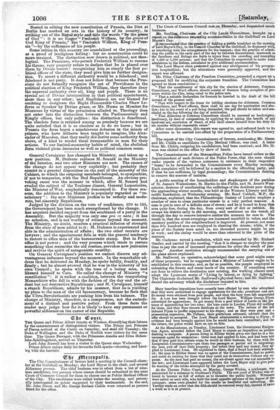General Cavaignac has changed his Ministry, and taken up a
new position. M. Dufaure replaces M. Senard in the Ministry of the Interior, and two other Ministers are new. The causes of the change do not appear very explicitly ; but probably they consist in a general disposition on the part of the minority of the Cabinet, to which the outgoing members belonged, to sympathize, if not to temporize, with the Red Republicans. An obvious pro- voking cause was the manner in Which, after M. Senard had evaded the subject of the Toulouse dinner, General Lamoriciere, the Minister of War, emphatically denounced it. For these rea- sons, the addition to the Ministry is popularly regarded as "re- actionary " : the new Ministers profess to be orderly and. mode- rate, but sincerely Republican. Judged by the division on the vote of confidence, 570 to 155, the Government has been much strengthened by the change. It has acquired decided support from the semblance of a party in the Assembly. But the majority was only one pro re nata ; it has no cohesion, and is not worthy of reliance beyond the moment. The Ministry, no doubt, receives a practical infusion of strength from the class of men added to it : M. Dufaure is experienced and able in the administration of affairs ; the two other recruits are lawyers ; and the appointment falls in with the general tendency to restore to office men of the bureaucratic stamp. But in Paris office is not power ; and the very process which tends to restore something that resembles the old routine, provokes new jealousies and revives the spirit of antagonistic anarchy.
On General Cavaignac's position we cannot discern any ad- vantageous influence beyond the moment. In the remarkable ad- dress that he delivered on Monday, he spoke boldly, frankly, and firmly ; but he almost avowed that he was in the minority of his own Council ; he spoke with the tone of a losing man, and likened himself to Cato. He called the change of Ministry "a conciliation ": it is rather a coalition, between the temporizing Monarchists who fall in with the fashion of the day and the ar- dent but not destructive Republicans ; and M. Cavaignac, himself a stanch Republican, admits by his manner, that he is yielding up place to the men of the old bureaucracy, because he feels that the Ultra-Revolutionists are pushing him from his balance. The change of Ministry, therefore, is a compromise, not the embodi- ment of a distinct and positive policy. From these facts the reader may judge how far it is likely to have any permanent or powerful influence on the career of -the Republic.


























 Previous page
Previous page